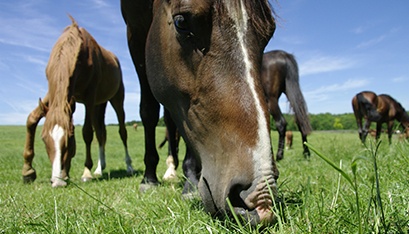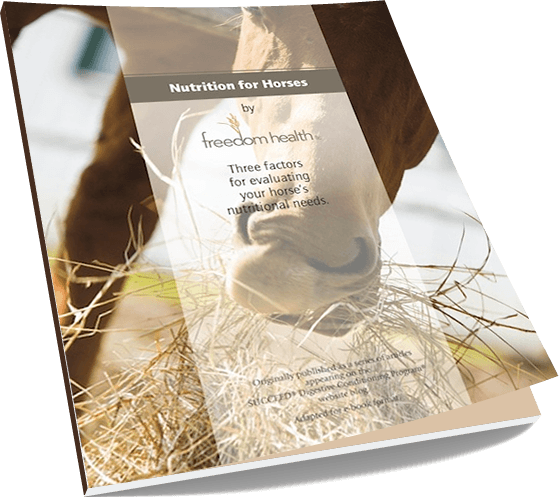There’s no shortage of horse health products on the market, all claiming to do wonderful things for your horse. It can be difficult to sort through which ones are worth your money and will actually make a difference in your horse’s wellness. A good place to start is ensuring that your supplements are backed by solid research and testing.
Horse Health and Nutrition Articles
Understanding how to maintain your horse’s digestive health is much easier when you are more informed. Freedom Health has produced a number of articles and papers on horse health and nutrition. These studies and articles are presented here, along with other third-party articles, as resources for horse owners, riders and trainers.
Veterinarians interested in viewing scientific research studies on SUCCEED may do so by registering for access to the SUCCEED Veterinary Center. The SUCCEED Veterinary Center is an exclusive resource for practitioners, providing information and research on SUCCEED products as well as equine digestive health.

*Please note that access to the SUCCEED Veterinary Center is only available to veterinarians.
Freedom Health Articles
| Title | Author | Summary |
|---|---|---|
| Read: What’s Really Wrong With My Horse? | by Emma Hardy, PhD | Many of us got into this equine business and competition because of our love for horses. At one point, didn’t we all have a dream of a pristine and peaceful life with our equine companions? But as time passes and reality sets in, we find ourselves instead continually facing a range of issues, obstacles and challenges. |
| Download PDF: Modern Problems: How Modern Care and Feeding Can Affect Horse Health, Behavior and Performance | Freedom Health, LLC | Horse owners, breeders and trainers, especially those with horses used in performance, are familiar with common equine digestive tract health conditions such as colic and ulcers. At the same time, equestrians deal with a variety of performance and behavioral issues in their horses virtually every day which adversely affect their progress and experiences in training, competition or leisure riding. These two categories of issues may be partially or entirely related. |
| Download PDF: Is Your Horse Off Its Feed? | Freedom Health, LLC | If your horse is off its feed, the first thing to do is call your veterinarian. Although people can fast for weeks, horses cannot exist for long without food. A farm visit by your veterinarian may be necessary to determine the cause of your horse’s disinterest in food. |
| Download PDF: Why Does Your Horse Tie Up? | Freedom Health, LLC | Many horse owners and trainers have experienced the frustration of having their horse tie up when exercising. In mild cases, the horse will stop and refuse to budge because its muscles are cramped. In more severe cases, the horse may not be able to stand up and can suffer organ damage and death. |
| Download PDF: Does Your Horse Have Ulcers? | Freedom Health, LLC | If you have a performance horse, the odds are that it has an ulcer. The stresses of competition, such as stalling, heavy exercise and intermittent feeding, can take a heavy toll on equine health. |
| Download PDF: Why is Your Horse so Temperamental? | Freedom Health, LLC | The answer to why some horses are flighty one moment and lethargic or stubborn the next may involve more than a simple nod to the characteristics of the average high-performance horse. In fact, the true culprit in this all-too-common temperamental behavior may instead be the performance horse diet. |
| Download PDF: Is Your Horse Anemic? | Freedom Health, LLC | For year many veterinarians have noted low levels of anemia in performance horses. This condition is extremely common but hardly ever commented upon. Any level of anemia, however, is not natural and may indicate a serious problem for the horse. |
| Download PDF: What are we doing to our horses? | Freedom Health, LLC | Modern equine practice has substantially changed the way horses eat. But are we doing the right thing? In this article, we will look at how horses in the wild eat, and then take a look at how we treat them today. As you will see, we may not be doing all the right things, and this may adversely affect the very performance we are striving to enhance. |
Other Related Articles
| Title | Author | Summary |
|---|---|---|
| Download PDF: Gut Feelings | Karen Briggs Originally published in USDF Connections, May 2008. | A dressage horse in motion embodies elegance, power and grace. At least that’s what we strive for. But it can be difficult for a horse to be spectacular on the outside if he feels lousy on the inside – and that’s the harsh reality for many performance horses, according to research findings. |
| Download PDF: Equine Digestive Tract Structure and Function | by Dr. Bob Wright From Ontario Ministry of Food and Agriculture, 1999. | A horse has the same requirements for energy, protein, vitamins and minerals as other animals but differs in the type and function of its digestive system, falling between a ruminant and non ruminant. |
| Download PDF: How Understanding the Digestive Process Can Help Minimise Digestive Disturbances | from the Proceedings of the BEVA Specialist Days on Behaviour and Nutrition. Ed. P.A.Harris et al | A basic understanding of the digestive processes and how diet can have an impact can be very valuable when deciding how to feed horses optimally. The above provides a general overview of the relevant processes and points out a few areas where our feeding practices can be very influential. |
| Download PDF: Feeding Horses Properly Means Enhanced Performance | by Stephen B. Blezinger, PhD, PAS | While many producers believe all a horse needs is grass and hay and maybe a little horse and mule feed every few days, research and application has shown that horses have a very specific nutritional physiology and in order for these animals to perform at their best, they must be fed and managed appropriately. |
| Download PDF: The Natural Horse and Unnatural Behaviour | from the Proceedings of the BEVA Specialist Days on Behaviour and Nutrition. Ed. P.A.Harris et al | This paper gives a short review of the role of the horse in its natural environment and community, and its adaptations for survival in that role; it will include feeding behaviour; social behaviour and communication; as well as reproduction and developmental behaviour. The implications of modern equine management practices will be discussed within each section. |

FREE eBook:
Nutrition for Horses
Three factors for evaluating
your horse’s nutritional needs.
